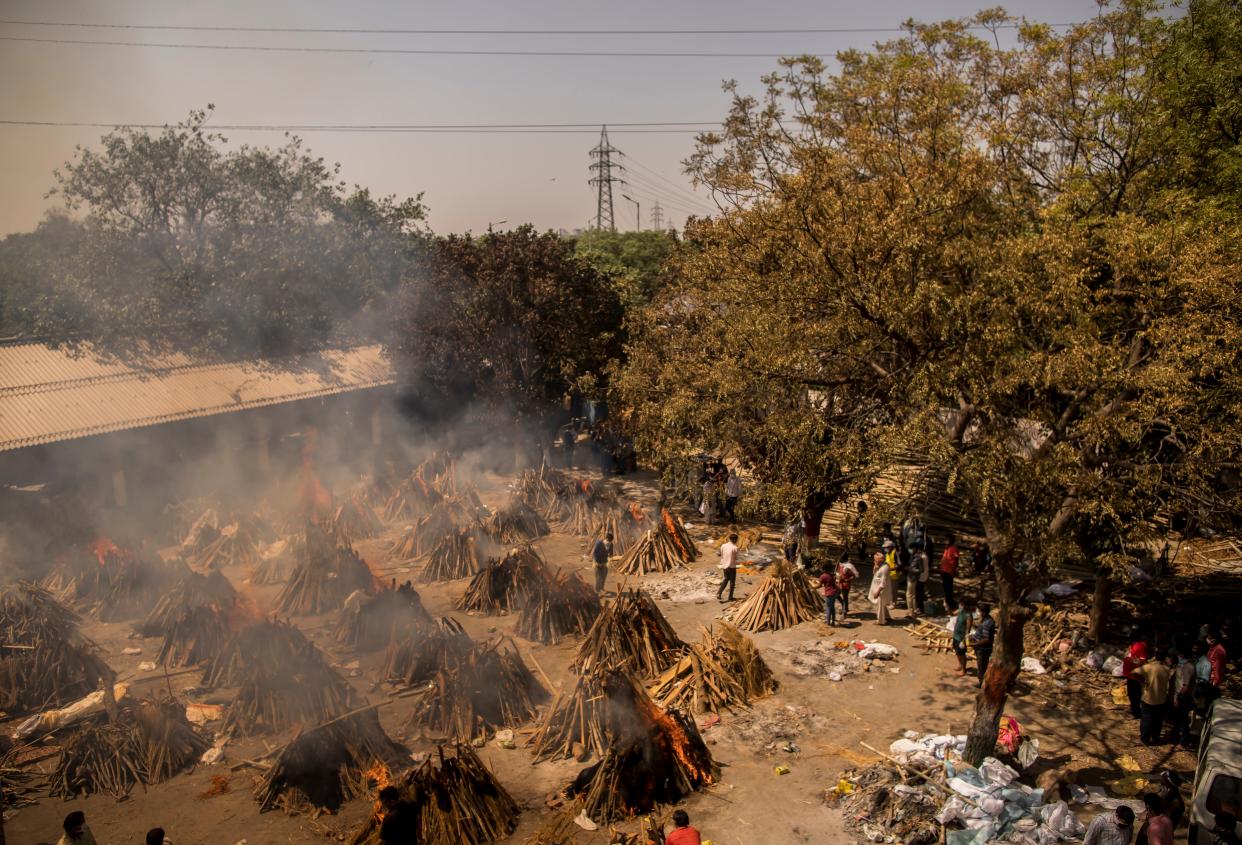‘Vaccine apartheid’: US under fire for sitting on stockpile while developing nations face deadly shortage

A general view of multiple burning funeral pyres of patients who died of the Covid-19 coronavirus disease at a crematorium on April 24, 2021 in New Delhi, India.
(Photo by Anindito Mukherjee/Getty Images)Joe Biden entered the White House promising to get 100 million Covid-19 vaccine shots in arms by the end of his first 100 days.
The vaccine rollout, after an inauspicious start, picked up such pace that the White House was able to pass the 200 million shot mark comfortably before the president’s 100th day in the job next week.
In China, the government announced on the same day as the White House that it had also passed the 200 million shot milestone, and is aiming to vaccinate half a billion people by July.
Health experts say that now more than one billion doses have been given across the globe, but the disparity in access is a stark one.
So much so that African countries such as Namibia and Kenya have vilified the distribution as “vaccine apartheid”, comparing the advantage secured by wealthy nations to the system of racial discrimination that divided South African society.
Thirty nations are still to receive a single dose of any vaccine as the virus surges in developing countries and sets a record pace in India, which is breaking global records at more than 300,000 new infections a day.
While India has given more than 132 million shots, its population of 1.36bn means that a tiny percentage of the country have been vaccinated.
And with hospitals and clinics being overwhelmed by the spread of the virus in India, the knock-on effect to other developing countries trying to secure vaccines is serious.
The World Health Organization-backed Covax scheme to distribute vaccines equitably has been hit because India, a huge vaccine producer, is relied on to supply it.
Earlier this month the president of Namibia was asked to speak at a WHO press briefing for World Health Day. But instead Hage Geingob took the opportunity to demand that the WHO deliver the vaccines his small nation of 2.5 million people had already paid for.
“Building a fairer and healthier world will require concerted action, require that we as members of the human family come together to do everything that is required to return our societies to normal,” he said.
“There is vaccine apartheid. I am saying that we, as a country, have paid a deposit but up until now we didn’t get any vaccines.”
Namibia has received just 3,000 Covid-19 jabs so far, while on 20 April California’s Los Angeles County distributed 25,491 on its own.
In total the US has now vaccinated more than 41 per cent of the population, while in Namibia less than 0.1 per cent of people have received it.
WHO director-general Dr Tedros Ghebreysus has repeatedly criticised the “moral catastrophe” of richer nations sitting on desperately needed vaccine supplies.
“It’s a travesty that in some countries health workers and those at-risk groups remain completely unvaccinated,” he said.
Globally just 2.3 per cent of the world’s population is fully vaccinated, and in Africa it’s less than 1 per cent, according to Ingrid Katz, the associate faculty director at the Harvard Global Health Institute.
“It you look at the data globally, you’ll see that about 75% of the vaccines have gone to only 10 countries globally. There’s massive, massive inequality,” she told National Public Radio.
Wealthy European countries without manufacturing capability have also struggled, with Germany, Spain, Italy and France all having less than 7 per cent of people fully vaccinated.
“Many countries still have no vaccines whatsoever,” Rob Yates, executive director of London-based think tank Center for Universal Health at Chatham House, told The Washington Post.
“You’re seeing much anger, and I think it’s justified.”
Meanwhile the People’s Vaccine Alliance, a coalition of over 50 organisations including African Alliance, Oxfam and UNAIDS, estimates that pharmaceutical companies Pfizer, AstraZeneca and Johnson & Johnson have paid out $26bn in dividends and stock buybacks to shareholders in the past 12 months.
Oxfam estimates that the payouts would be enough to vaccinate 1.3bn people, the same as the whole population of Africa.
And the CEOs of the companies have also profited massively, with BioNTech founder Ugur Sahin now worth an estimated $6.8bn and Moderna CEO Stephane Bancel worth an estimated $5.6bn.
“This is a public health emergency, not a private profit opportunity,” said Oxfam Health Policy Manager Anna Marriott.
“We should not be letting corporations decide who lives and who dies while boosting their profits. We need a people’s vaccine, not a profit vaccine.
‘Vaccine apartheid is not a natural phenomenon but the result of governments stepping back and allowing corporations to call the shots.
“Instead of creating new vaccine billionaires we need to be vaccinating billions in developing countries.”
And she added: “It is appalling that Big Pharma is making huge pay-outs to wealthy shareholders in the face of this global health emergency.”
Read More
UK Covid-19 vaccinations: Latest figures
More action, less talk, distinguish Biden's 100-day sprint
Teenager charged after seven-year-old shot dead at McDonalds

